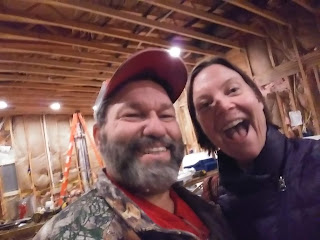Transitions Are Hard
“Transitions are hard.”
My friend Terri made this statement last month while we were
having dinner in Richmond, Indiana, and the words keep coming up for me. They
resonate with me. There is so much truth in those three simple words.
Whether we realize it or not, our lives are always in a
state of transition.
Too often we think of transition as only a major shift in
our lives. This week, our friends Benjamin and Mali and their two children came
for a visit near the end of their epic RV road trip across America. In the past
year they transitioned from having one child to two, Mali transitioned from
working full time to part time, they transitioned from living in a home they
own to living in a rented RV, and their next transition is a move to New
Zealand where they have committed to stay for at least a year. (You can read
their story here: Flawless Plans.)
I think that pretty much makes them crazy. But Randy and I
have also had many major transitions in our lives in the past two years and we’ve
been surrounded by others who have also made major shifts: moving, retirement, death,
marriage, turning 16…
And then there are seasonal transitions. School years are
wrapping up and summer vacation is upon us. Rain is falling and fields are
being planted and sweaters are being put away to make room for swimsuits and
shorts. Randy is inundated with catering jobs, from weddings to graduation parties...
But none of those transitions were what Terri and I were
talking about when she said, “Transitions are hard.” We weren’t talking about
major moments. We were talking about everyday life. We were talking about
ordinary things. We were talking about the transitions we make daily.
For many people, those transitions take place during a daily
commute to work. You literally transition from home to work and back again. And
during that physical transition, your mind undergoes a transition as well. It might be a transition from being a parent to being an engineer. Or being a nurse to being a wife. The transition is important, because you don't want to treat your spouse like a patient, or your boss like a teenager.
But
for me, my office is in the same room as our kitchen, living and dining room. I
don’t have a physical transition when I “go” to work. But I still have to make
that mental shift. I have to be able to block out the television and the
refrigerator and the laundry in order to put words on a page. And while there
is a lot of creativity that goes into my job, there is also a lot of critical
thinking and perfectionism that has to happen for me to be good at what I do.
But I certainly don’t want to be critical or a perfectionist in my relationship
with Randy, so I have to make another mental shift to move from Working Katie
to Partner Katie at the end of the day. And for me that takes intentionality. It
takes shutting down the computer and filing away my work calendars. It takes a
text from Randy that says, “See you in 4 minutes,” so that while he drives home
from his shop I can make that mental drive as well. It takes sitting down
together when he gets home to talk about our work days, and then setting aside
those tasks and focusing on our relationship.
“Transitions are hard.”
Yes, they are. But with intentionality, by making not only a
physical shift but a mental one as well, and by giving ourselves permission to
need that mental shift, we can make them less so.





Comments
Post a Comment